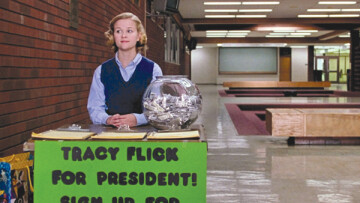What is New Is Old Again
Aaron Murtagh | Sunday Aug. 31st, 2014
Aaron Murtagh
Back in June, I sat down with Jill Joyce, the new owner of a long-loved video store in town. I began venting my frustrations about generating story ideas as a new contributing writer for the Bozeman Magazine. This is my first writing job and I have been surprised by how quickly the deadline arrives each month. Jill quickly responded that she has thousands of DVDs at her store and suggested that I stop by some time to get inspired.
It took a while, but eventually the night rolled around when my wife knew what movie she wanted to watch but we couldn’t find it at the library, or on Netflix, or Amazon. So, on a balmy August night, we took a drive to Jill’s store. Driving at twilight, the cool dusk air rushing through the windows, I was taken back to my Ohio youth when I’d borrow my dad’s car after dinner and drive around aimlessly.
The nostalgia doubled me over as we walked into the video store. When was the last time I physically rented a DVD or video, even? When I was a kid, renting a videocassette was one of my favorite events. I would spend the weekend with my grandparents and my grandmother would take me to the video store where I got to pick out two tapes. One video was to view that night with a giant bowl of ice cream while my grandfather breathed heavily in the background whenever an actor swore. And the second tape was to be watched at breakfast.
This level of indulgence pales in comparison to the double feature my wife had planned for that night. As they say, I married up. She was on the hunt for Father of the Bride Part II; naturally part one would be rented with it. Both sounded fun to me but I wanted something with a little more je ne sais quoi for my article. Feeling nostalgic, I picked up Alexander Payne’s Election, starring Matthew Broderick and Reese Witherspoon. Then, feeling guilty, I bee-lined to the criterion collection display and grabbed Douglas Sirk’s 1954 melodrama Magnificent Obsession.
Undoubtedly, Father of the Bride, either part, is entertaining and beguiling. Both parts tell the story of a stagnant man struggling to keep up with the pace of the world around him. The pace that he finds so grueling is usually set by the women in his life. His wife and daughter constantly balk at his unwillingness to proceed enthusiastically and then laugh while he drags his heels through life’s milestones. Husband and wife filmmaking team Nancy Meyers and Charles Shyer remade the 1950 and 1951 originals, Father of the Bride and Father’s Little Dividend, both receiving writing credits with Shyer as director. Since then, Meyers has moved into the director’s position. She directed the highest grossing film made by a woman, What Women Want, and subsequent female centric rom-coms. So its interesting to look at Father of the Bride, originally a 50’s comedy centered around Spencer Tracy’s character, Stanley T. Banks, and the ways the 90’s version sees the female characters challenge and fight for center stage. These films could be seen as the mid-section of Meyer’s career because the projects that follow, The Parent Trap, Something’s Gotta Give, The Holiday, and It’s Complicated, all have a female lead. The films also act as a barometer for the shift in Hollywood, that post 90’s finds more and more projects with female characters centering the plot. Hollywood could be compared to Mr. Banks, dragging it’s heels, hoping to churn out the same blockbusters and high-budget spectacles while the audience around it seeks out more interesting films.
In the same year that Nancy Meyers and Charles Shyer divorced, Paramount released Alexander Payne’s second film, Election. Based on the novel by Tom Perrotta, the film was a moderate box office hit, was nominated for an academy award, and has been ranked #61 on Bravo’s “100 Funniest Movies”. As a part of my nostalgia trip, Election was the perfect gateway to my high school memories. In April 1999, I was a freshman in high school. I played tuba in the marching band. I had braces. I started taking Accutane. This could be painful to look back on but filtered through Payne’s sly, take-no-prisoners lens I can only see high school (and American politics) as a laugh-a-minute farce. As in all of Payne’s work the casting and the performances are so well executed it’s hard to believe there are any movie stars on screen. He frequently casts non-actors to fill in the supporting roles and background of the film. They filmed much of the movie at a real high school while classes were in session. Payne met Chris Klein while location scouting and ended up casting him in his first film role as Tracy Flick’s rival, Paul Metzler.
Payne changed the setting of the story from New Jersey to Nebraska. Payne is from Nebraska and also set his first film, Citizen Ruth, in his hometown of Omaha. The setting and the landscape become a character in Election. The bleak sky and suburban sprawl act like a Greek chorus commenting on the aspirations of the protagonists. And in some way, this enormous grey-green rolling countryside feels like quicksand, creating an eternal obstacle for all the people. A bee stings Mr. McAllister and Paul Metzler breaks his leg skiing: evidence that the natural world will best man any chance she can. This perspective on man vs. nature could be the epicenter of Alexander Payne’s sense of humor. When faced with impossible odds at least a sense of humor will keep you from buckling under the pressure.
Three years after Vincente Minelli directed Father of the Bride Universal Pictures released Douglas Sirk’s remake of the 1935 film Magnificent Obsession. That’s a lot of dates to keep track of but it is important to recognize the cycles of Hollywood relying on past success to predict the future. Sirk was a German-born filmmaker who came to America, around 1940, and made his name with lush melodramas from about 1950-60. His work was commercially successful but not until the 70’s did academics start looking at his films critically. He is now regarded as a great critic of post-war American society. The plot of Magnificent Obsession is undoubtedly ridiculous. A wealthy playboy (Rock Hudson) learns what’s really important in life when he falls for a blind widow (Jane Wyman).
I found Election easier to watch than Magnificent Obsession but I also found the random comparison interesting in many ways. Both films are based on books.
Both books are inspired by real life events. Perrotta based much of the plot of Election on a news story about a conservative school principal who destroyed ballots in a prom queen election to keep a pregnant student out of the court. Magnificent Obsession is based on a novel by Rev. Lloyd C. Douglas who was inspired by the story of an ER doctor from Ann Arbor, MI. And although Sirk wasn’t considered a comic during his time, both films can be watched as wryly satirical portraits of American life.
Going back to school can be fun. It’s an opportunity to put learning and your curiosities at the front of your priorities. Just like what Nancy Meyers has done with romantic comedies, just like what French critics did by re-examining the films of Douglas Sirk, just like what Alexander Payne did by comparing high school to American politics - it is always worth revisiting something with a new perspective and seeing what you missed. Go back and rewatch an old movie you thought you didn’t like, see if there’s anything there.
| Tweet |
